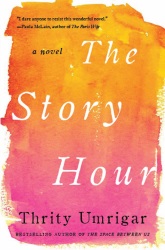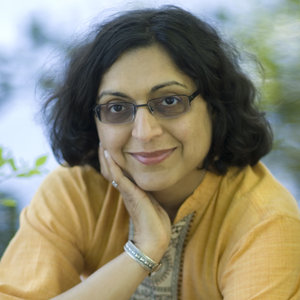The Story Hour
Thrity Umrigar
|
|
In a recent interview about her latest novel, “The Story Hour,” Thrity Umrigar declared: “More than anything else I want to tell a story with integrity.” The author of a memoir and five previous novels including the bestselling “The World We Found,” Umrigar has more than realized her ambition with “The Story Hour,” a taut, suspenseful page-turner with depth, heart, and psychological credibility whose believable and endearing characters ponder the meaning of friendship, the challenges of marriage, and the value of storytelling itself. The novel’s dual heroines, Lakshmi and Maggie, seemingly could not be more different. Lakshmi, an Indian immigrant in a miserable marriage (her husband’s nickname for her is “stupid”), has swallowed a slew of pills after learning that a man she’d pined for (a customer at her husband’s grocery store) is moving to California. Maggie is a black, upper-middle-class professional who’s risen from a difficult childhood in a “rundown Caribbean neighborhood in Brooklyn” to become a successful psychologist with a seemingly idyllic marriage to a professor husband, Sudhir, who adores her. Separated by “education, language, nationality, race,” they are divided also by role: Lakshmi as patient to Maggie’s doctor. Lakshmi is initially taciturn, even hostile toward Maggie (she shares some of her husband’s toxic racism), and Maggie approaches Lakshmi with prejudices of her own. But the women quickly discover some striking points of connection: Both are married to Indian men and both lost their mothers at an early age. Both are outsiders struggling with feelings of guilt and shame. Moreover, and unbeknownst to Lakshmi, Maggie, too, is hovering on the brink of infidelity. Maggie has always been eminently “capable of detaching herself from her patients’ problems” and has “prided herself on her ability to maintain the wall of separation between home and hospital.” But drawn to Lakshmi out of both “pity” and identification, she allows the wall to crumble. First, she offers to treat indigent Lakshmi for free at her home office, then accepts gifts of homemade Indian food. And after Sudhir insists that “what Lakshmi needs is not analysis . . . [but] a job. Independence. Money of her own,” Maggie hires her to cater a party and clean her house, then brokers other cooking and cleaning jobs. The women’s bond is mutually restorative: Lakshmi is profoundly grateful and quickly considers Maggie her best friend; Maggie cherishes the “vitality and wonder” that Lakshmi’s colorful stories about her childhood in India and ingenuous warmth bring to her life. Both women, however, live with the heavy weight of “confusing . . . [and] shameful” secrets. We learn Maggie’s in the novel’s opening pages: She was molested by her father and is embarking on an affair with Peter, a dashing photographer whose work in “war-torn or famine-struck” countries provides an alluring counterpoint to Sudhir’s practicality. Lakshmi doesn’t reveal her devastating secret until two-thirds of the way through the novel, and her “confession” threatens to overturn everything Maggie, and the reader, thought we knew about her. Is Lakshmi really the passive, helpless, innocent “victim,” or is she devious, cunning, immoral? Maggie, horrified and disoriented, is “unable to provide the absolution that Lakshmi” wants and can offer her “no words of consolation, or solidarity, or empathy.” The fissure widens when Lakshmi discovers that the woman she’d idolized is betraying her devoted husband, leading her to enact a revenge that changes “the trajectory of [Maggie’s] life . . . forever.” As Lakshmi’s life improves, Maggie’s falls apart; the reversal is deftly handled, and our dual sympathies maintained. “The Story Hour” is told in alternating voices, first-person broken and often incorrect English from Lakshmi (a style some may find problematic, even offensive), and close third person from Maggie’s perspective. Early on, Maggie muses on “the opacity of human relations, the inability to truly know someone else,” but Umrigar’s narrative technique divulges these two self-covering women in all their vulnerability and complexity. However, occasional breaks from the convention — a few pages from Peter’s point of view, a first-person interlude from Maggie — seem arbitrary or unnecessary, and to present Lakshmi’s confession in polished third-person English is an odd decision. In “The World We Found,” Umrigar writes: “she was irreducibly in love with this bewitching planet, this thrilling life, this heartbreaking species she belonged to, with its capacity for stupefying destruction and breathtaking magnanimity.” The world of “The Story Hour” brims with the same capacity for destruction and magnanimity, and its readers may find themselves thrilling to it as to a living world, well and truly heart-struck by its psychological acuity, lyricism, and generosity of spirit. Priscilla Gilman | 16 Aug 2014 | Boston Globe
|


 Thrity Umrigar
Thrity Umrigar